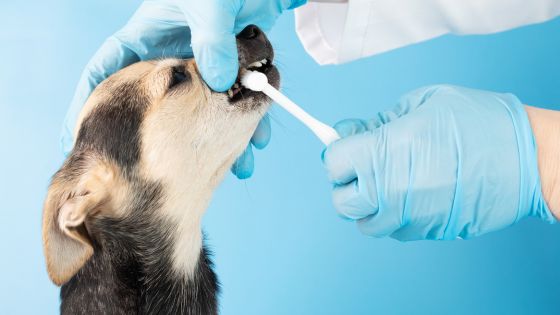Bad breath in dogs is common, but is it normal?
While bad breath in dogs is not uncommon, it could be a sign not only of dental disease, but serious health issues such as liver or kidney disease. Please make an appointment to see your veterinarian sooner rather than later. The longer your dog is left untreated, the more difficult the problem could be to treat.
What Causes Bad Breath in Dogs?
- Tooth decay, tartar build up, abscess, gum infection
- Infection in lungs or sinuses
- Diet, type of food he’s eating
- Kidney disease – If your dog’s kidneys aren’t working properly, they can’t filter toxins and waste material so they build up in the body, causing bad breath
- Liver disease
- Growths or lumps in the mouth that become infected
- Your dog is eating poop! If your dog eats poop, you’ll want to read this article!
As you can see, there are several causes for bad breath, and the first step to identifying the problem is a visit to your vet.
NOTE: For the sake of this article, we will be discussing bad breath as the result of dental issues.
Do We Take Dog Dental Care Seriously?
Is it just me, or does it seem like we don’t take dog dental care seriously. Does your vet really look in your dog’s mouth when he/she goes for their twice yearly check up? Does he or she ever talk about dental care?
There is a whole month (February) dedicated to spreading the word about the importance of pet dental health, and I’m jumping on that bandwagon because it’s so important!
A lack of oral hygiene over the years will catch up with our dogs and can cause serious organ damage (heart, kidney, liver) as infection enters the bloodstream, significantly shortening their life.
Not every case will be that extreme, but that doesn’t mean your dog is not experiencing pain from a toothache or infection right now! Dogs are good at hiding pain, so just because you aren’t noticing an obvious change in his behavior, doesn’t mean there isn’t a problem festering and getting worse.
Think back to how much pain you’ve been in from a cavity or abscess. You were able to reach for pain relief and visit the dentist, but your dog has to wait for you to figure it out.
There is good news though because it’s never too late to start caring for your dog’s teeth, and right now is the best time to start.
Signs Your Dog Has Dental Problems
- Bad breath
- Pawing at his mouth
- Struggling to eat/loss of interest in eating
- Seems withdrawn or not himself
- Not chewing on a favourite toy
- Won’t let you near his mouth
- Swallows without chewing
- Favours one side when eating
- Less interested in playing
- Drooling
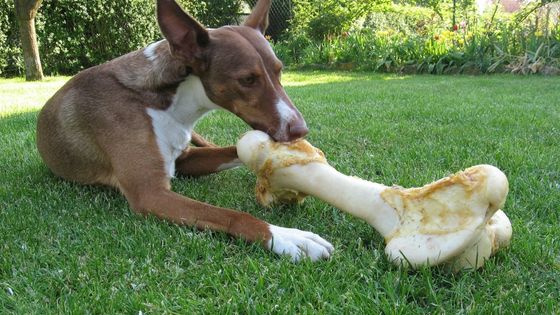
What’s the Next Step?
You’ve been able to say “yes” to some of the symptoms above, now it’s time to make an appointment to see your vet as soon as possible. I’m not suggesting it’s a bad idea to buy doggie dental products such as toothpaste, a toothbrush and a water additive, but they won’t fix any current problems your dog is experiencing. However, they will be helpful for maintenance.
What to Expect at Your Vet Appointment
Your vet will want to know about your concerns, so what I often recommend is making notes before the appointment. Sometimes we feel rushed or are nervous, and forget to mention something important. Making notes ahead of time will give you time to remember all the points you wanted to discuss, and make the time you have more productive. Be sure to let your vet know of any recent changes in diet. You never know, that could be the cause!
Next, the vet will check your dog’s mouth and determine to the best of his ability, what he believes is going on. Bear in mind some dogs are extremely uncooperative, like all of mine for example, so he may not get as good a look as he would like. If there is evidence of periodontal disease, it will be obvious. The extent of it won’t be, that’s only possible with x rays.
If your dog’s teeth look fine with no obvious explanation for bad breath, your vet will want other tests to determine what’s going on. Those tests can include: blood, urine, stool, ultrasound…
Don’t worry, your vet will explain it all.
Treatment
Treatment will depend on the cause, but since this article is specifically about dental disease, we’ll assume some evidence of it has been found. It’s possible the problem is minor and all that’s needed is for you to brush your dog’s teeth regularly. If an infection is evident, antibiotics will be prescribed. If your vet feels the problem needs a greater level of intervention, surgery may be recommended. Only under anesthesia can your vet take the x rays needed, and have a proper look at your dog’s mouth. His teeth will be cleaned and some may be extracted if necessary.
Is Surgery on an Older Dog Safe?
If surgery is recommended, the next part of that conversation will be about risk and expense. Money is an issue for many of us, but since we’ve taken on the responsibility of sharing our lives with pets, it is our responsibility to care for them as best as we can.
I know of many senior dog parents who won’t entertain the thought of letting their senior dog undergo surgery. I get it. It’s scary, and we don’t want to do anything that could put our dogs at risk. However, that decision is often made without even speaking to the vet to get his expert opinion.
Cost
In my experience the cost is always more than expected, which is not surprising. You can get an estimate in advance, but until your vet has put your dog under, taken x rays and had a good look at his mouth, he won’t know the full extent of the problem or what needs to be done.
My vet prints out a detailed list of everything involved in a surgery, which are the basic costs you’ll need to pay. Then we talk about possible scenarios (extractions for example) and how much extra they cost. By the end of the conversation I have a pretty good idea of what the worst case scenario (meaning lots of teeth pulled) could total.
If you need help with vet bills and are looking for ways to reduce the costs of caring for a senior dog, please read the articles below.
Where to Get Help With Vet Bills
How to Save Money on Senior Dog Care
Risk
Heart murmurs are pretty common in older dogs, and I know that’s one of the things that scares people about anesthesia. It certainly scared me. While any concern is valid and should never be dismissed by a vet, anesthesia is a lot safer than it ever was. My vet even gave my dog Red a mild dose like you would give for a baby. For me, the key is trusting your vet.
Discuss the pros and cons of putting your dog through the surgery. Talk about the benefits of doing it, as well as what could happen if you didn’t go ahead with it. Be sure your vet explains what to expect the first night and day or two after surgery, will pain medication be provided, how your dog may behave and what you can do to help.
Ultimately, the decision to go ahead with surgery or not is yours. Keep this in mind – if it is recommended and you put it off, the problems can only get worse, your dog will get older adding to the risk, surgery will be longer, more invasive and the cost higher.
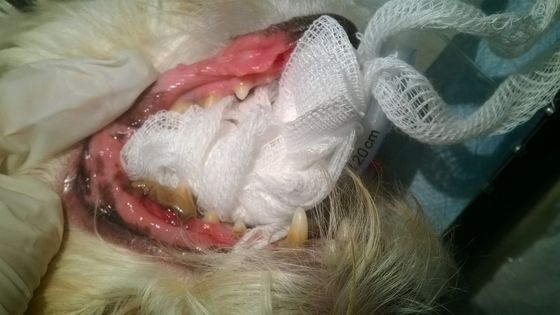
Maintaining Your Dog’s Dental Health
Now that your dog’s dental issues have been resolved, it’s important to maintain those healthy teeth and gums.
Yearly or twice yearly checks
Make sure during your yearly or twice yearly checkups, the vet takes a good look at your dog’s mouth.
Regular brushing
The more often you brush your dog’s teeth the better, so if you can do it daily, fantastic. If not, do it as many times a week as you can. A quick brush is better than nothing.
There are a number of styles of toothbrush, so it might be a case of trial and error. Here are some of the options…
- Long handled with a brush on one end
- Long handled with a large brush on one end, small one on the other
- A finger brush that, you got it, fits over your finger and has bristles at the top
- 3 sided brush
- Electric toothbrush
- A simple piece of gauze wrapped around your finger (this worked best for my dog Red)
Only use a toothpaste specifically created for dogs. There are a variety of flavours to entice, or make your own using one of the many homemade recipes you can find online.
Virbac Enzymati
Your dog won’t let you near his mouth
You’ve tried every style toothbrush, bought every flavour toothpaste, and your dog won’t let you near his mouth. Don’t worry – you can buy tooth gel that you just rub on your dog’s teeth to help prevent plaque, and even a powder to sprinkle on his food.
Will these, or the other options I’m going to talk about in a minute take the place of regular brushing? Not according to my vet, but they are all still worth implementing into your dog’s new dental routine, because everything you do will make a difference.
Dental chews
The act of “gnawing” helps scrape the teeth, remove plaque and stimulate the gums. If you are unable to brush your dog’s teeth, then I highly recommend dental chews. Even if you do brush they will still help, and relieve boredom.
When deciding which chews to buy, walk away from any with an ingredient list as long as the packaging that is impossible to identify. If your dog has diet restrictions, check the ingredients with your vet first.
Never leave your dog unattended when he has a bone or a chew.
Chew toys
Chew toys, textured chew bones, rubber bones and rope toys are great additions to your dog’s oral hygiene routine. The benefit of a toy over an actual food product is the lack of calories, and no ingredients that might be forbidden in your dog’s diet. Keep things interesting by switching between toys and chews.
Water additive
A mouthwash added to your dog’s water bowl is another worthwhile product, but not to be relied on to be effective on its’ own. They may alter the taste of the water, but my dogs have never had a problem. If you notice your dog drinking less or not at all, stop using it right away. Keeping your dog well hydrated is crucial.
Raw food diet
Gnawing on raw meat acts as a teeth cleaner, a natural toothbrush, and chewing on raw bones can help remove tartar. It seems there is a lower incidence of dental disease in animals on a raw food diet, although that does not mean dental disease never happens.
Please don’t run out and buy raw meat or bones without consulting a holistic vet, or your regular vet to determine if it’s right for your dog.
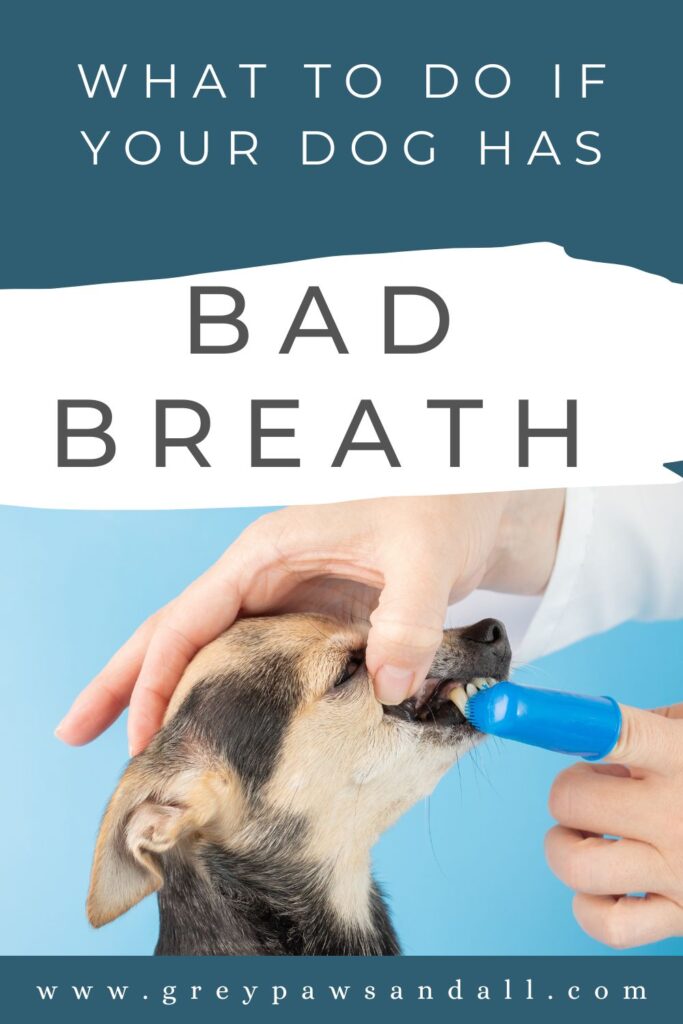
How I took Care of My Dog’s Teeth
I’m going to use two of my dogs as examples – Red and Jack.
Red
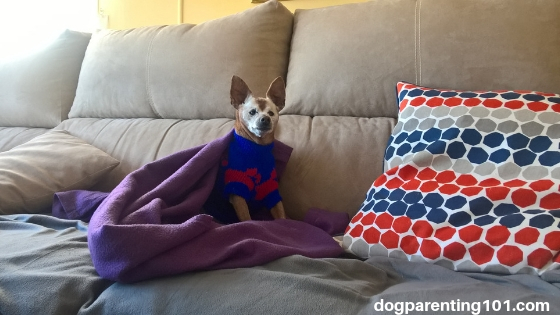
Red only weighed about 9-10lbs, but if you went anywhere near her mouth with what felt like a foreign object, she’d clamp that jaw shut and nothing would get in. I assume a lot of that had to do with the fact she was blind and didn’t know what was happening, although you’d think in time she would have gotten used to it…but no.
I started off with a long handled toothbrush, but she got so stressed I had to give up after a few tries. I found her only slightly more agreeable when I wrapped gauze around my finger, put a bit of toothpaste on it and brushed her teeth that way. I also put an additive in the water bowl. At the end of the day, you can only work with what you have!
The last time she had dental surgery she was 15ish, had a heart murmur and kidney issues. She was also blind, but I adopted her when she was blind and I believe she had been living that way for quite some time.
I had a discussion with my vet about the pros and cons of putting her through an operation. The thing is, I trust him completely and I knew if something were to happen during the surgery, it would not have been his fault. My vet pointed out, if I waited a few months and did a re-check, all that would mean is she would be a few months older and more at risk. It’s not like dental issues ever resolve themselves.
I was worried she may have been in pain, which is not something I could accept. I also worried her dental issues may have been more extensive then originally thought during a quick exam on an uncooperative dog so I said yes. I made the right decision because after sedation and x rays, he found things were worse than expected . Long story short, Red had 6 teeth removed.
The first night was a bit tough as I knew it would be. She was blind so being groggy was scary for her. She was on pain medication and I gave her Arnica to help her body recover from the surgery. By the next morning Red was back to normal.
Jack
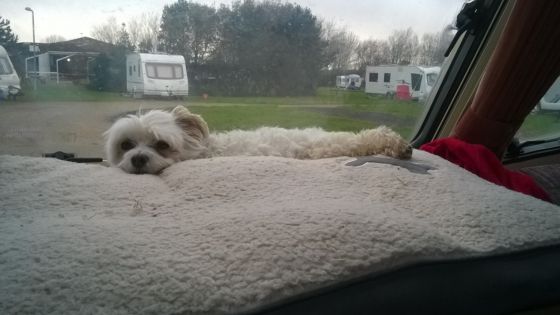
Forget about even going near Jack’s mouth. At least Red had a sweet, easy going nature, Jack is feisty. He had a couple of dental surgeries and did well, but with his failing health we would no longer risk it. I take him to my groomer to have his teeth done every 3-4 weeks. According to my vet she seems to do a pretty good job. Not sure if she gets all his back teeth, I guess it depends on his mood, but it makes a massive difference.
If you’ve had an old dog with dental disease, why not take a moment to share your story. Your experience will help others so please post it below.
If you’re looking for a community of senior dog parents, a place where you can find helpful tips, support and people who “get it” please join my FB group Senior Dog Care Club
I help senior dog parents struggling with anticipatory grief and quality of life issues by offering practical tips, advice and one on one support.
I am also a Certified Pet Loss Specialist, helping you navigate through your pet loss journey.
Click this link to book a FREE 20 minute discovery call, visit my service page to find out more or email hindy@greypawsandall.com if you have any questions.
I’ve been rescuing and caring for senior dogs since 2009. From vision and hearing loss to obesity, dementia, kidney disease, liver issues, cardiac problems, Cushing’s, mobility challenges and more, you could say I’ve dealt with and learned a lot! In addition to my hands on experience, I’ve taken many courses and earned several qualifications to keep learning how to help senior dogs and they include: Senior Dog Enrichment, Understanding Canine Anxiety, Care of the Senior Pet and I’m a Certified Pet Loss Specialist.

